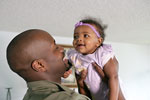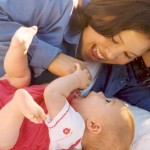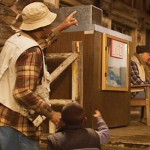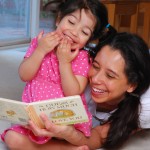 TEDxRainier
TEDxRainier
In this presentation (filmed in October 2010), Patricia Kuhl shares astonishing findings about how babies learn one language over another — by listening to the humans around them and “taking statistics” on the sounds they need to know. Clever lab experiments (and brain scans) show how 6-month-old babies use sophisticated reasoning to understand their world.
 February 10, 2011
February 10, 2011 This article explores the significance of babies’ babble, and how these first sounds and utterances lead to more advanced communication, including both receptive and productive language. It appears that babies’ around the world babble in similar ways, and researchers are becoming increasingly interested in interpreting these sounds and the impact they have on both cognitive and social development.
This article explores the significance of babies’ babble, and how these first sounds and utterances lead to more advanced communication, including both receptive and productive language. It appears that babies’ around the world babble in similar ways, and researchers are becoming increasingly interested in interpreting these sounds and the impact they have on both cognitive and social development. A recent study confirms that increased televison time in a household leads to decreased verbal interaction between parent and child. Since interaction is one of the most important ways to stimulate a baby’s brain growth, less interaction can only lead to less productive brain growth. The study also explored the impact of television on young children’s verbal development.
A recent study confirms that increased televison time in a household leads to decreased verbal interaction between parent and child. Since interaction is one of the most important ways to stimulate a baby’s brain growth, less interaction can only lead to less productive brain growth. The study also explored the impact of television on young children’s verbal development. How a mother cares for her baby may determine her child’s future vocabulary and language abilities, regardless of a family’s economic status. Research shows that from a very young age, children are influenced by the way their mother’s verbally interact with them.
How a mother cares for her baby may determine her child’s future vocabulary and language abilities, regardless of a family’s economic status. Research shows that from a very young age, children are influenced by the way their mother’s verbally interact with them.
 Patricia A. Cutspec, Ph.D.
Patricia A. Cutspec, Ph.D. The home literacy environment has an important role in young children’s emerging literacy and social-emotional development. An emphasis has been placed on storybook reading at home. However, it has been unclear how often (quantity) storybook reading should occur or how parents should interact (quality) with a young child while reading together. Results reveal the role that both characteristics (quantity and quality) play in young children’s (emerging) literacy development and the parent-child relationship.
The home literacy environment has an important role in young children’s emerging literacy and social-emotional development. An emphasis has been placed on storybook reading at home. However, it has been unclear how often (quantity) storybook reading should occur or how parents should interact (quality) with a young child while reading together. Results reveal the role that both characteristics (quantity and quality) play in young children’s (emerging) literacy development and the parent-child relationship.